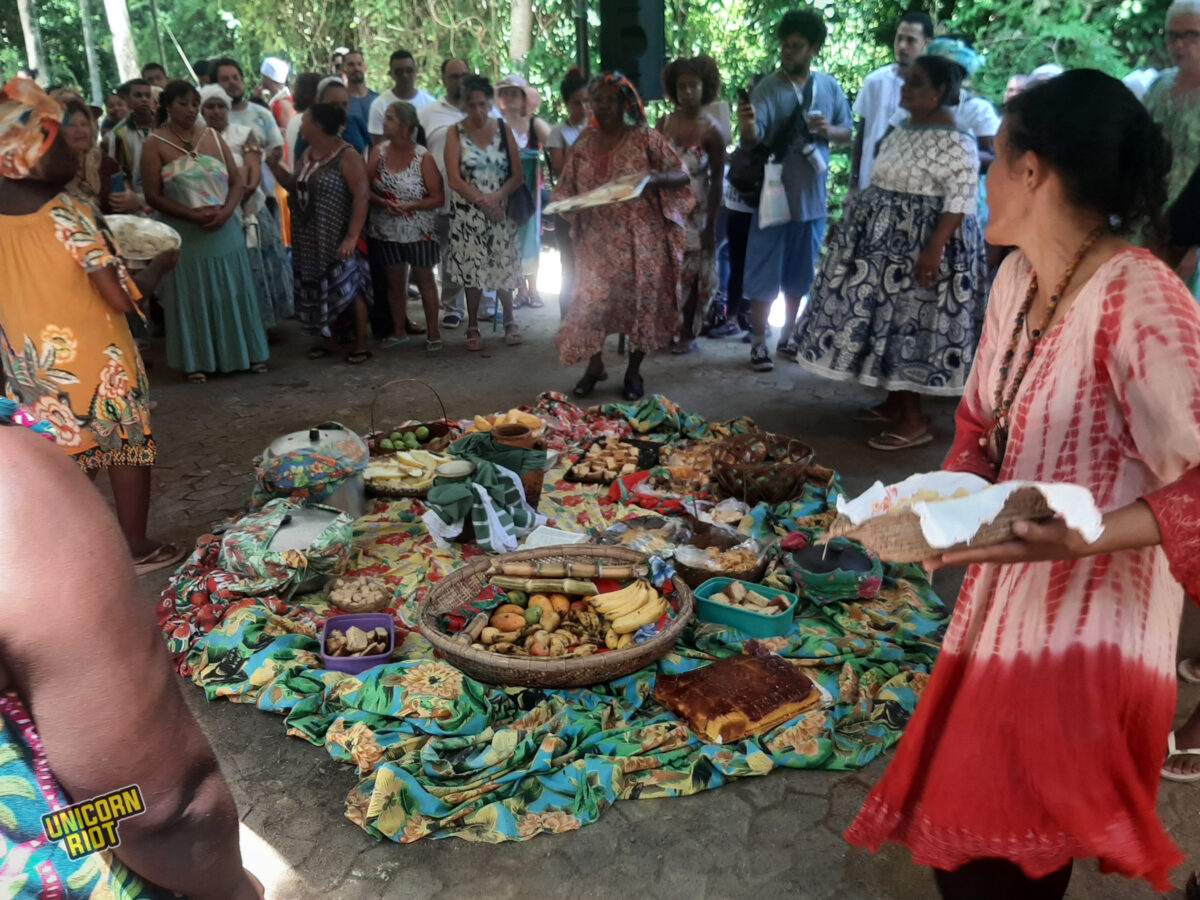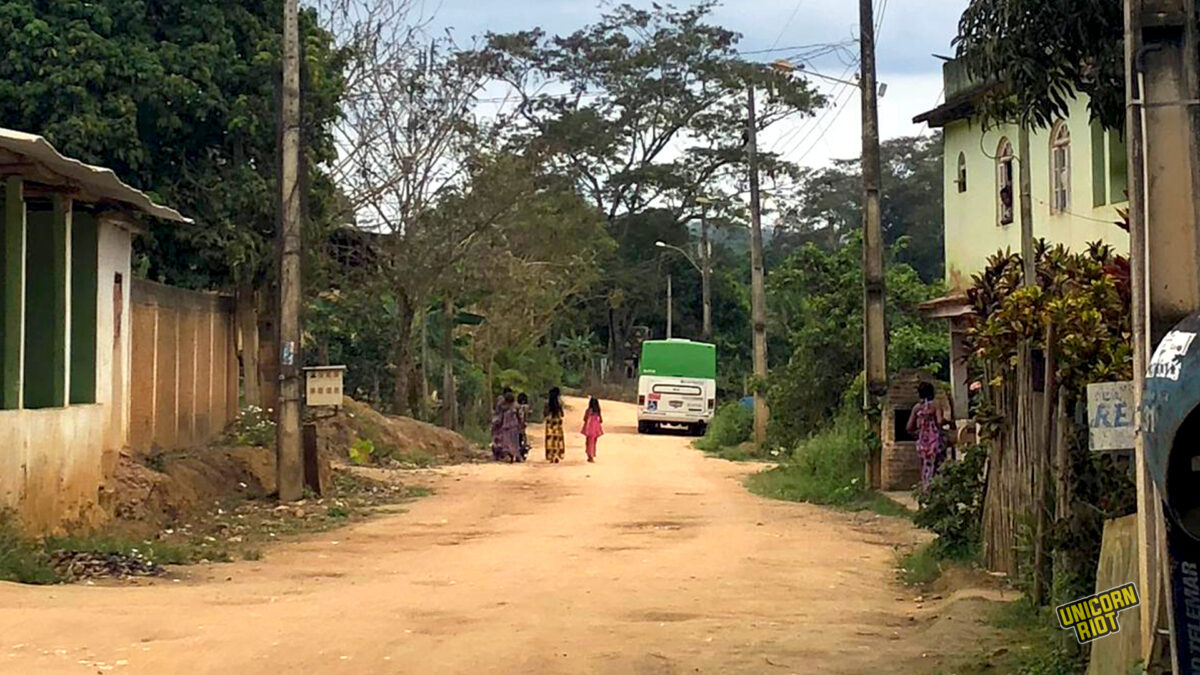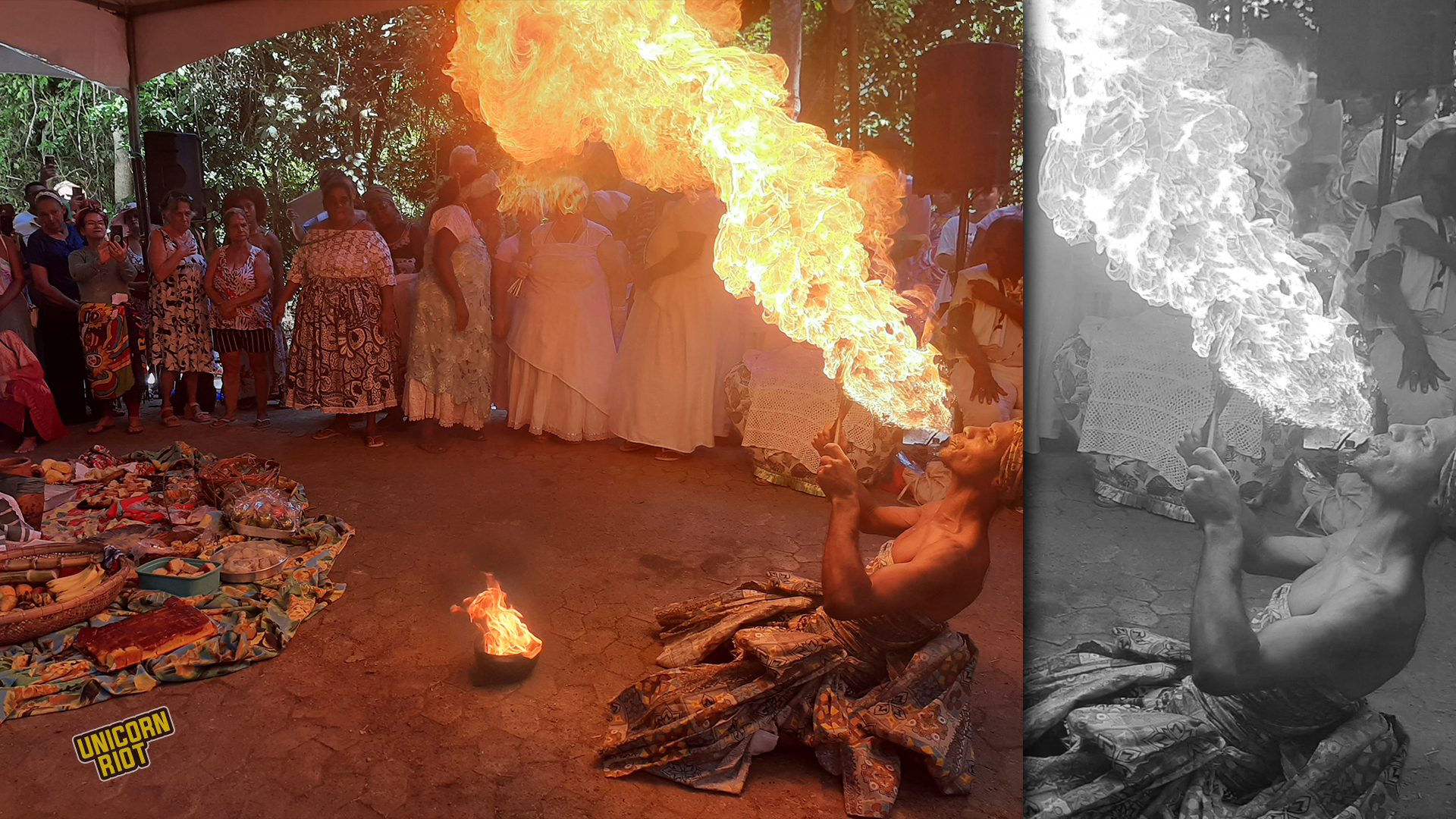Brazil: Slave Revolt Celebration, Deadly Police Op, Bolsonaro’s Issues and Marielle’s Killers Arrested
Espírito Santo, Brazil — Providing an update from Brazil, we look at new happenings in four stories that Unicorn Riot has explored in the past; post-slavery commemorations, police killings, Bolsonaro’s legal troubles and the murder of Councilmember Marielle Franco.
Celebrating the Queimado Insurrection
Days of gatherings and events took place to celebrate 175 years since the Queimado Insurrection, the largest slave revolt in the history of the Brazilian state of Espírito Santo. Events started with the annual Contemporary Zombies Night Walk. Participants walked 17 km (10.5 miles) through the night and early morning before the celebration. After starting the walk on March 16 at 9 p.m. in Praça Chico Prego, an Afro Cultural festival took place in Recanto do Céu at 2 a.m. with the walk resuming an hour later and ending around 6 a.m.
Night Walk participants, residents and representatives of the Black Capixaba Movement then met at the Ruins of the Queimados Church on March 17 for celebrations that began at 9 a.m.
Religious representatives from the city of Vitória and the surrounding Cariacica and Serra municipalities’ performed cultural presentations and traditional African songs, mostly in the Yoruba language. Each municipality represented an element; Vitória the fire, Serra the clay and Cariacica the water.
After the performances, food was presented to the Gods and “Orixás” (Yoruba deities) and then a community meal took place. Plans were made for an annual “Queimado State Insurrection Week” from this year onward, between March 19 and 26.

History of the Queimado Insurrection
Led by Chigo Prego, Eliziário Rangel and João da Viúva, enslaved Black people revolted after Italian friar, Gregório José Maria de Bene, backed out on his promise to free the men on March 19, 1849.
For political interests, de Bene wanted to build a church on farm land in Queimado, and as part of an agreement with the farmers he promised a letter of manumission, to free the enslaved people who worked on the construction of the temple.
In order to complete construction by the agreed deadline and acquire freedom, the enslaved people worked constantly and finished the church ahead of schedule. However, Friar de Bene did not comply with the agreement. In response, a popular uprising began involving over 300 people, including men, women and children.
The revolt lasted five days before being brutally repressed with police forces ruthlessly killing hundreds. Many enslaved people were murdered and their bodies were dumped in what is now called “Lake of Souls.”
One of the main leaders of the insurrection, Eliziário Rangel, was arrested. According to local history, after a miracle from Nossa Senhora da Penha, the patron saint of the State of Espírito Santo, Rangel escaped from prison never to be captured again. Chico Prego and João da Viúva were hanged.
In a square in the municipality of Serra there is a statue of Chico Prego and the Municipal Culture Incentive Law is named after him while Rangel has a community center named after him.
Those who managed to escape founded Quilombo de Rosa D’água, in Cariacica. Quilombos are independent, self-sustaining communities in the back-country of Portuguese settlements where escaped slaves found refuge and a space for uniting other escaped slaves under a common purpose of liberation.

São Paulo Police Kill 56 People During Operation
In one of the most deadly massacres in Brazil’s history, São Paulo police killed 56 people and made 1,025 arrests during the four month-long “Operation Summer,” according to data from the São Paulo Security Secretariat (SSP).
Last summer, a military police officer was killed by a sniper from the organization PCC (First Capital Command) during an operation in a coastal area of Brazil’s most populous city, São Paulo. Police fixated on that region and in December started Operation Summer to combat drug trafficking. The second phase of the operation was initiated in February after the killing of another military soldier Samuel Wesley Cosmo during a raid on a favela.
Operation Summer was announced to have ended on April 1, 2024. It was the deadliest operation since the Carandiru massacre in 1992, drawing criticism from human rights groups, the Police Ombudsman’s Office and the State Public Defender’s Office.
The police say those killed were suspects killed during clashes. This narrative is questioned by many of the victims’ families and friends. “They said there was a shootout but it’s a lie!” said Beatriz da Silva, the wife of one of the dozens of victims killed by police. Several residents, including suspects and innocents, were killed in different communities.
The State Council for the Defense of Human Rights (CONDEPE) filed a lawsuit against Guilherme Muraro Derrite, then Secretary of Public Security of São Paulo, for administrative improbity. The governor of São Paulo is Tarcísio de Freitas, a supporter of Bolsonaro and the district still has a strong presence of Bolsonaro supporters.
Related: Brazil: Nearly 7,500 Fall Victim to Femicides and Police Killings – Aug. 2022
Related: Police in Brazil Killed Record Amount of People in 2020 – Sept. 2021
Ex-President Bolsonaro Faces Potential Prison Time
After being ruled ineligible to run for office until the year 2030, the former president of Brazil, Jair Messias Bolsonaro, is increasingly close to being arrested for several crimes allegedly committed during his term, as well as during the 2022 elections and after.
In new legal troubles for Bolsonaro, minister of the Supreme Federal Court, André Moraes, asked the Hungarian court for explanations about the two days that the former president hid at the country’s embassy shortly after his passport was seized by the Brazilian Federal Police during investigations into the alleged military coup attempt by Bolsonaro and his supporters.
Related: Bolsonarist Extremists Attack Brazilian Government a Week After Lula Inauguration – Jan. 2023
Related: Bolsonaro Ineligible to Run for Office Until 2030 – July 2023
Marielle Franco’s Killers Arrested
Large criminal organizations, militias, and clans linked to politicians, police and the military have controlled swaths of Brazil since the end of the military dictatorship in the 1980s. Former President Jair Bolsonaro’s family is one of those clans. As the far-right began to take hold in Brazilian politics, criminals with links to the Bolsonaro Clan have been linked to the assassination of 38-year-old Marielle Franco, a rising leftist politician and her driver Anderson Gomes in 2018. In March of 2024, the former military police officer turned hitman, Ronnie Lessa, confessed to the murders and entered into a plea agreement with prosecutors in exchange for lesser prison time.
Days later, Brazilian Federal Police launched Operation Murder Inc. at dawn on March 28, and arrested Rio’s former police chief Rivaldo Barbosa and former federal congressman Chiquinho Brazão and his brother Domingos Brazão, a former state congressman who advises the court of auditors. The Brazão brothers are suspected of being the masterminds behind Franco’s killing and Barbosa helped to cover it up.
Franco’s family said in a statement: “This is a historic day for Brazilian democracy and an important step forwards in the pursuit of justice. Nothing will bring back our Mari but we are one step closer to the answers we crave.”
Related: ‘Marielle, Presente’ – March Marks Feminist Struggles in Brazil – April 2023
Niko Georgiades contributed to this report for Unicorn Riot.
Follow us on X (aka Twitter), Facebook, YouTube, Vimeo, Instagram, Mastodon, Threads, BlueSky and Patreon.
Please consider a tax-deductible donation to help sustain our horizontally-organized, non-profit media organization:

Unicorn Riot's Coverage From Brazil:
- ‘Marielle, Presente’ – March Marks Feminist Struggles in Brazil - April 13, 2023
- Over 100 Families Occupy Abandoned Apartment Complex in Brazil - February 20, 2023
- Bolsonarist Extremists Attack Brazilian Government a Week After Lula Inauguration - January 12, 2023
- Elder Woman Released After 27 Years of Slave-like Servitude in Brazil - January 5, 2023
- With Lula Elected President of Brazil, the Left Consolidates itself as a Power in South America - November 9, 2022
- Elections in Brazil: Second Round Slated for October 30 Between Lula and Bolsonaro - October 7, 2022
- Ribeirão Favel’Arte, Festival of Arts and Culture in Brazilian Favelas - September 7, 2022
- Indigenous Official and British Journalist Murdered in Brazilian Amazon - July 7, 2022
- ‘Bolsonaro Never Again’ Protests Come Among New Wave in Government Scandals - May 19, 2022
- COVID Commission Finds Bolsonaro Committed “Crimes Against Humanity” - December 15, 2021
- Brazil: 600K Deaths, Emergency Aid Ends, Protests Continue, & People Call for Lula 2022 - October 9, 2021
- Brazil: Mutual Aid During COVID-19 and Bolsonaro’s Mismanagement - September 19, 2021
- Police in Brazil Killed Record Amount of People in 2020 - September 8, 2021
- Are the “Fora Bolsonaro” Protests Enough? - August 26, 2021
- Brazil: Hoping for a Vaccine, Food on the Plate and #ForaBolsonaro - July 9, 2021
- Brazil: The People, at Last, Took to the Streets - June 3, 2021
- The Invisible “THEY” - Apr. 29, 2021
- “Brazil is Asking for Help” – Artists and Activists Speak Out - Apr. 10, 2021
- Brazilian Pandemonium: COVID-19 Kills Over 300K - Mar. 27, 2021
- Brazil Nears 200K Deaths as Politicians Continue to Downplay COVID-19 - Dec 20, 2020
- Echoes of George Floyd in Brazil: Man Kneeled On, Killed by Security Guard - Nov 23, 2020
- The Coronavirus Crisis in Brazil – An Interview with EmiciThug - May 22, 2020
- “Enough of Being the Blood that Promotes Fascists”: Viewpoints From Brazil - May 15, 2019


